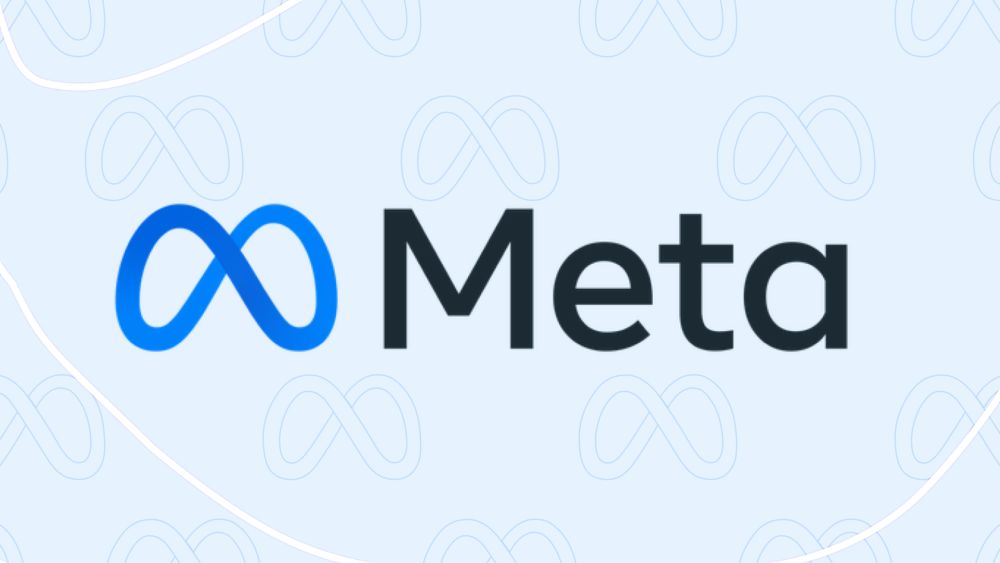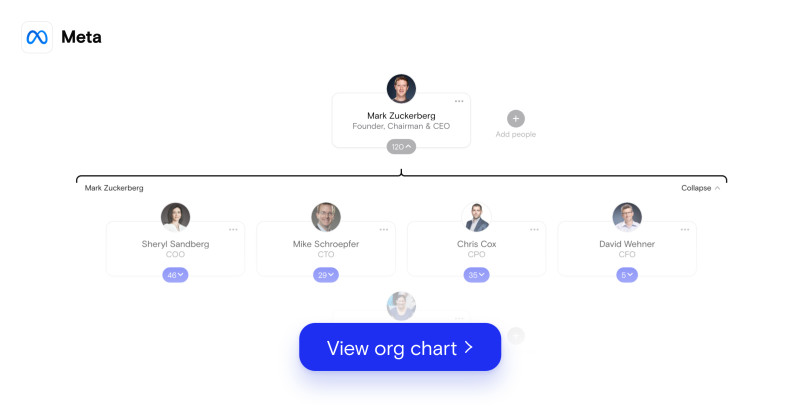- Iterate
- Meet The Team
- Facebook is Going Meta, These are the Leaders Taking it There
Facebook is Going Meta, These are the Leaders Taking it There
New name, slightly new org chart. Now that Facebook renamed its corporate brand to Meta, several titles at the top of the org chart were updated as a result. Mainly those at Facebook Reality Labs have become one and the same with Meta, and a new company-wide focus on VR will make those jobs some of the most important.

New name, same org chart.
On Thursday, CEO Mark Zuckerberg capped off his company’s keynote AR/VR event by announcing a new name for Facebook’s corporate entity: Meta.
The name is inspired from the Greek for “beyond,” and it officially marks Facebook’s era into a new phase that Zuckerberg calls “metaverse first,” meaning overtime, users will no longer need a Facebook account to access the metaverse and its products.
Meta is also splitting its core business lines into two separate functions. It will still have its Facebook app and the family of apps that it owns like Instagram and WhatsApp. But it's betting its future on the metaverse - or a new virtual reality universe that Meta is helping to build while designing exclusive products to access it as part of its Reality Labs.
The keynote event was an anticipated one that covered a lot of information, even if it didn't break much news (other than a name change) but it was also a peek into how leadership is changing inside the new corporate entity and who has been leading the charge into Meta’s new line of products.
Mark Zuckerberg will remain CEO of Meta and oversee all operations and has no plans to step down anytime soon. In an interview with The Information, Zuckerberg said he hasn’t seriously considered stepping down and that he believes these two new business functions are too intertwined.
The metaverse isn’t going to build itself. Kicking things off, Andrew Bosworth (or Boz as he’s known inside the company) has been leading the initiative into Facebook’s virtual reality projects as the Head of Facebook Reality Labs. As Builder of the Metaverse, Bosworth’s recent elevation to CTO highlights just how high of a priority virtual reality is to the company, and Bosworth will continue to lead the way on developing the technology that will make the metaverse possible.
Another title change to reflect Meta’s commitment to the metaverse is bumping Vishal Shah from the Head of Metaverse at Facebook Reality Labs to the redundant title of VP of Metaverse at Meta.
Shah worked for over six years on the product team at Instagram, most recently as VP of Product. In his new role, he will be overseeing pretty much everything the virtual reality landscape touches.
Zuckerberg was adamant to highlight just how important commerce will be in his idealized version of the metaverse, and just how Instagram adapted to brands and retailers once a Facebook acquisition took place, a similar fate seems to be in the future of the metaverse. At the keynote event, Shah even sat down with popular beauty influencer Jackie Aina to discuss how creators could get creative selling products to their fan base using both augmented reality and virtual reality.
Building further on creator relationships, Meta is also rolling out more hybrid solutions, to get creators and the general public more familiar with augmented reality. Sue Young will lead this initiative as Head of Spark AR. Spark AR Hub aims to provide creators the tools necessary to build more AR experiences. It also is the division inside Meta that most closely links its new metaverse ambitions to its core family of apps.
Spark allows creators the ability to use, manage, track and understand the performance of using AR effects across Meta’s family of apps and devices. It’s available to anyone with a Facebook account. Young has been with the company for nearly a decade and has worked her way up from an intern to a Director of Product Management. She has spent the past year working on building Spark AR for all of Facebook’s apps, but has also worked to grow a similar tracking tool for Facebook’s Events Products.
Though the metaverse in theory will be available to anyone who can access it, a huge focus for Meta has been to develop the hardware that it hopes will eventually dominate that access. At the keynote event, Zuckerberg revealed the company has been working on the secretive Project Cambria — a new VR headset that will be more expensive than the Oculus Quest 2 headset that Facebook released earlier this year.
Leading the initiative behind Project Cambria is Head of VR Devices Angela Chang. Chang formerly worked as Product Director at Oculus, and was a key figure in building the Quest 2.
VP of Global Affairs and Communications Nick Clegg will be in charge of making sure that all these new products and the metaverse itself will be built responsibly, a daunting task for any one executive. A former member of the UK Parliament, Clegg has been with the company since 2018, and according to an interview with the Guardian that same year, stepped into the role to “build bridges between politics and tech.”
Meta is not fully in the clear from the mountain of public scrutiny it has been facing after internal documents were leaked to the press. Troves of executives have also left the company in the past six months, particularly in the advertising business. It’s unclear if this new corporate re-branding will have any effect on rebuilding Meta’s reputation back with the public, but it’s a bold new era that is being built anyway.
Create your own free org chart today!
Show off your great team with a public org chart. Build a culture of recognition, get more exposure, attract new customers, and highlight existing talent to attract more great talent. Click here to get started for free today.
In this article


The ORG helps
you hire great
candidates
Free to use – try today
